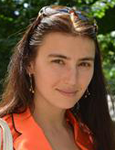Abstract
The necessity of readiness training of future humanitarian teachers for professional activity in polysubjective learning environment has been proved. The structure of the specified readiness has been analyzed. The subject and interactive, cognitive, competence-active components as the components of readiness of future humanitarian teachers for professional activity in polysubjective learning environment have been justified and characterized.References
Семиченко В.А. Психология деятельности / В.А.Семиченко. – К.: Изд-во Ешке А.Н., 2002. – 248 с.
Чайка В.М. Підготовка майбутнього вчителя до саморегуляції педагогічної діяльності: [монографія] / В.М.Чайка, за ред.. Г.В.Терещука. – Тернопіль: ТНПУ, 2006. – 275 с.
Кашлев С.С. Технология интерактивного обучения / С.С.Кашлев. – Мн.: Беларусский вересень, 2005. – 196 с. – (Педагогика, обращенная в завтра)
Коряковцева Н.Ф. Современная методика организации самостоятельной работы изучающих иностранный язык: [пособие для учителей] / Наталия Федоровна Коряковцева. – М.: АРКТИ, 2002. – 176 с.
Советский энциклопедический словарь / под ред. А.М.Прохорова. – М., 1987. – 720 с.
Морська Л.І. Стратегічна компетенція у навчанні іноземних мов: теоретичні та методичні аспекти: [монографія] / Лілія Іванівна Морська. – Тернопіль: Вектор, 2012. – 218 с.
Современный словарь иностранных слов. – М.: Русский язык, 2000. – 684 с.
Ніколаєва С.Ю. Цілі навчання іноземних мов в аспекті компетентнісного підходу / Софія Юріївна Ніколаєва // Іноземні мови. – 2010. - № 2. – С.11-17.
Oxford R.L. Hero with a Thousand Faces: Learner Autonomy, Learning Strategies and Learning Tactics in Independent Language Settings / Rebecca L.Oxford // Language Learning Strategies in Independent Settings. – Cromwell Press LTD., 2008. – P.41-63
O’Malley J.M., Chamot A.U. Learning Strategies in SLA. – Cambridge: CUP, 1990. – 412 p.
Stern H.H. What Can We Learn from the Good Language Learner? // Canadian Modern Language Review. - №31. – 1975. – P.304-318
Gremmo M.J. and Riley P. Autonomy, Self-Direction and Self-Access in Language Teaching and Learning: the History of an Idea / M.J. Gremmo, P.Riley // System. – 1995. – Vol. 23. – №2. – Р.151-164.
Аникина Ж.С., Агафонова Л.И. Развитие учебной автономии при обучении иностранному языку: к истории вопроса в зарубежной педагогике // Вестник ТГПУ. – 2009. – Выпуск 4 (82). – С.23-27.
Сластенин В.А. Формирование профессиональной культуры учителя. – М.: Прометей, 1993. – 177 с.
Абдулина О.А. Общепедагогическая подготовка учителя в системем высшего педагогического образования: Учебное пособие. – М.: Просвещение, 1984. – 240 с.
REFERENCES (TRANSLATED AND TRANSLITERATED)
Semichenko V.A. Psychology of activity/ V.A.Semichenko. – K.: Izd-vo Eshke A.N., 2002. – 248 s. (in Russian)
Chajka V.M. Pidgotovka majbutn'ogo vchitelja do samoreguljaciji pedagogichnoji dijal'nosti: [monografija] / V.M.Chajka, za red.. G.V.Tereshhuka. – Ternopil': TNPU, 2006. – 275 s. (in Ukrainian)
Kashlev S.S. Technology of іnteraktiv training / S.S.Kashlev. – Mn.: Belarusskij veresen', 2005. – 196 s. – (Pedagogika, obrashhennaja v zavtra) (in Russian)
Korjakovceva N.F. Modern methods of organization of independent work foreign language learners: [posobie dlja uchitelej] / Natalija Fedorovna Korjakovceva. – M.: ARKTI, 2002. – 176 s. (in Russian)
Sovetskij enciklopedicheskij slovar' / pod red. A.M.Proxorova. – M., 1987. – 720 s. (in Russian)
Mors'ka L.I. trategic competence in foreign language teaching: theoretical and methodological aspects: [monografija] / Lilija Ivanivna Mors'ka. – Ternopil': Vektor, 2012. – 218 s.(in Ukrainian)
Sovremennyj slovar' inostrannyx slov. – M.: Russkij jazyk, 2000. – 684 s. (in Russian)
Nikolajeva S.Ju. Objectives of teaching foreign languages in terms of the competence approach / Sofija Jurijivna Nikolajeva // Inozemni movi. – 2010. - № 2. – S.11-17.(in Ukrainian)
Oxford R.L. Hero with a Thousand Faces: Learner Autonomy, Learning Strategies and Learning Tactics in Independent Language Settings / Rebecca L.Oxford // Language Learning Strategies in Independent Settings. – Cromwell Press LTD., 2008. – P.41-63 (in English)
O’Malley J.M., Chamot A.U. Learning Strategies in SLA. – Cambridge: CUP, 1990. – 412 p.(in English)
Stern H.H. What Can We Learn from the Good Language Learner? // Canadian Modern Language Review. - №31. – 1975. – P.304-318 (in English)
Gremmo M.J. and Riley P. Autonomy, Self-Direction and Self-Access in Language Teaching and Learning: the History of an Idea / M.J. Gremmo, P.Riley // System. – 1995. – Vol. 23. – №2. – R.151-164. (in English)
Anikina Zh.S., Agafonova L.I. Development of educational autonomy in learning a foreign language : Background in foreign pedagogy // Vestnik TGPU. – 2009. – Vypusk 4 (82). – S.23-27. (in Russian)
Slastenin V.A. Formation of professional culture of the teacher. – M.: Prometej, 1993. – 177 s. (in Russian)
Abdulina O.A. Pedagogical teacher training in higher pedagogical education: Uchebnoe posobie. – M.: Prosveshhenie, 1984. – 240 s. (in Russian)
Authors who publish in this journal agree to the following terms:
- Authors hold copyright immediately after publication of their works and retain publishing rights without any restrictions.
- The copyright commencement date complies the publication date of the issue, where the article is included in.
Content Licensing
- Authors grant the journal a right of the first publication of the work under a Creative Commons Attribution-NonCommercial-ShareAlike 4.0 International License (CC BY-NC-SA 4.0) that allows others freely to read, download, copy and print submissions, search content and link to published articles, disseminate their full text and use them for any legitimate non-commercial purposes (i.e. educational or scientific) with the mandatory reference to the article’s authors and initial publication in this journal.
- Original published articles cannot be used by users (exept authors) for commercial purposes or distributed by third-party intermediary organizations for a fee.
Deposit Policy
- Authors are permitted and encouraged to post their work online (e.g., in institutional repositories or on their website) during the editorial process, as it can lead to productive exchanges, as well as earlier and greater citation of published work (see this journal’s registered deposit policy at Sherpa/Romeo directory).
- Authors are able to enter into separate, additional contractual arrangements for the non-exclusive distribution of the journal's published version of the work (e.g., post it to an institutional repository or publish it in a book), with an acknowledgement of its initial publication in this journal.
- Post-print (post-refereeing manuscript version) and publisher's PDF-version self-archiving is allowed.
- Archiving the pre-print (pre-refereeing manuscript version) not allowed.

